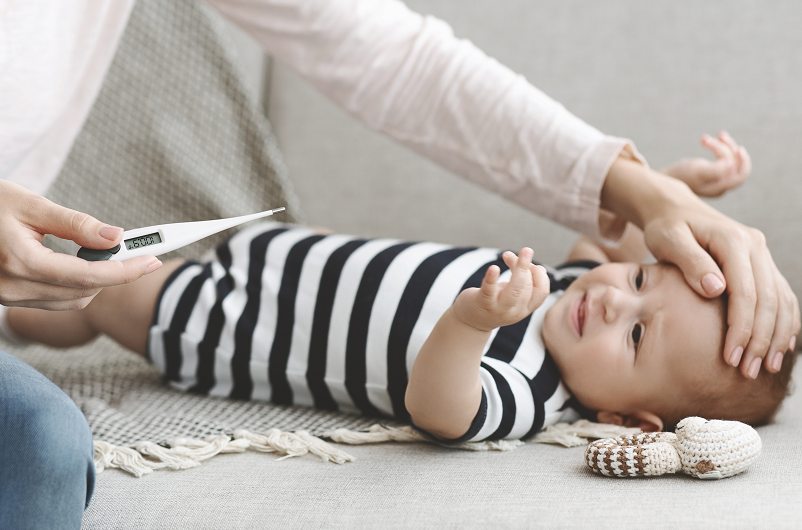What Do I Do When My Baby Gets a Fever?

April 17, 2023
Parents usually love documenting their baby’s firsts, unless it’s a first cold or illness.
A fever may make your baby fussy, drowsy or uninterested in eating. If your baby’s behavior changes, that may be the first sign of an illness.
How can you ease your baby’s symptoms and nurse them back to health? Our expert answers commonly asked questions about fevers in babies.
How can I tell if my baby has a fever?
First signs of a fever may be their skin feeling warm to touch, flushed or red cheeks, or a decrease in appetite.
A rectal thermometer is the most reliable way to take a baby’s temperature. The American Academy of Pediatrics considers anything over 100.4 degrees to be a fever.
What you should do for your baby’s fever depends on their age and/or symptoms:
- 0 to 3 months: Call the pediatrician right away if your baby’s temperature is 100.4 or higher.
- Babies under 24 months:
- Call the doctor if your baby has a fever along with any distressing symptoms like dehydration, lethargy, or irritability.
- If your child seems well, aside from the fever and typical upper respiratory infection symptoms like a cough or runny nose, you can monitor the fever. If you have concerns, you can reach out for your doctor’s guidance.
- Babies and children: Call the doctor if the fever reaches 104 degrees or higher.
“We tell parents, it’s most important to monitor how your baby is acting and how they look. You know what their normal activity levels are and their personality, so you’ll have a sense of if the fever is running its course, or if they could use a visit to the doctor,” says pediatrician Valerie J. Niketakis Wujciak, M.D.
What should I do if my baby has a fever?
Tylenol (acetaminophen) is an over-the-counter medicine that helps to reduce fever.
Always call the pediatrician before giving Tylenol to a baby. You may give Tylenol to toddlers aged 2 and older without calling a doctor.
Keep your baby comfortable – dress them in lightweight clothing and don’t overload them with blankets or heaters. While they may have chills, you do not want them to overheat from too many layers.
Hydration is key – keep watch of how much they are drinking, and make note of urine output through wet diapers. Being sick may impact their appetite, so do your best to keep them hydrated and contact your doctor if you notice:
- Lack of tears when crying
- Dry diapers
- Dry mouth
- Eyes looking sunken
- Fatigue, sleeping too much
How much Tylenol is right for my baby?
Be sure to check with the pediatrician before giving Tylenol to a baby.
Tylenol for infants is a liquid medication. Use the measuring tool that comes with the medicine, not a household spoon.
Your baby’s age and weight help to determine how much medicine they may need:
- Babies 0 to 3 months, or 6 to 11 pounds: 1.25 mL (milliliters)
- Babies 4 to 11 months, or 12 to 17 pounds: 2.5 mL
- Babies 12 to 23 months, or 18 to 23 pounds: 3.75 mL
Always consult your pediatrician before administering Tylenol or any kind of medication.
When to Seek Medical Care for Baby’s Fever
For a fever, you should contact your pediatrician if your child:
- is under three months of age
- has a fever of 104 degrees or higher
- has a fever that has lasted more than four days
- is dehydrated
- has difficulty breathing
“Most often, with low fevers, they will pass with time, however if you have any concerns, don’t hesitate to call your child’s pediatrician, they can guide you in recovery and let you know if additional care is needed,” says pediatrician Valerie J. Niketakis Wujciak, M.D.
Next Steps & Resources:
- Meet our source: Valerie J. Niketakis Wujciak, M.D.
- To make an appointment with Dr. Niketakis Wujciak, or a doctor near you, call 800-822-8905 or visit our website.
The material provided through HealthU is intended to be used as general information only and should not replace the advice of your physician. Always consult your physician for individual care.







